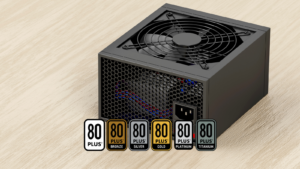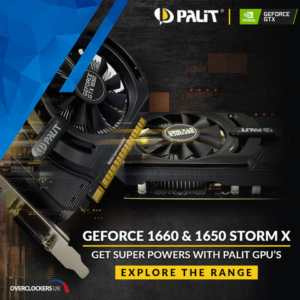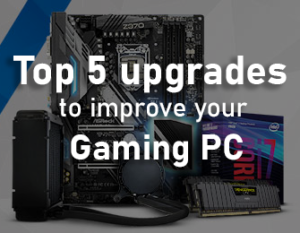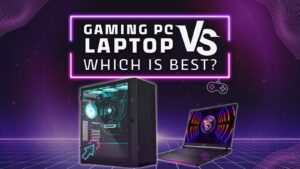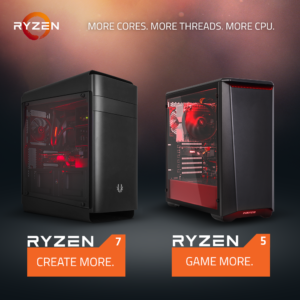 How To
How To
From your first custom gaming PC to your 100th, build with confidence using our step-by-step how-to guides and tutorials to create your dream computer.
How the New Companions Work in ESO: Blackwood
The Elder Scrolls Online's Blackwood Chapter, the latest in the game's thrilling, year-long "Gates of Oblivion" event, is finally out. With the expansion, comes a companion system being rolled out into the MMORPG for the first time. Equipped with their own gear, skills, and dialogue, these AI companions even come with their own rapport system. With this, comes another layer of impact towards your in-game decisions. Although they're not "sworn to carry your burdens", you'll have an armour-clad pal for combat (except PvP), conversation, and…
Power Supply Units Made Easy: Explaining 80 Plus Ratings
The power supply unit is a vital component of our gaming PC. But which model is the right one for you? There are many facets to that answer, and here we’re looking at 80 PLUS ratings. The 80 PLUS rating is a certification system that signifies how efficient your chosen PSU is. In this article, we’re taking a closer look at what they mean and how this rating should affect your choice. Power Supply Units: What It Is and What It Does Before getting into…
Kickstart Your Gaming Career With Game Academy
We've all had a lot more free time recently. Many people took up a new hobby, made home improvements or started a new fitness program. However, if you're an avid gamer it's highly likely you pushed all that to the side. Instead, choosing to spend hours wracking up XP, improving your rank or finally delving into a neglected Steam library. You might be feeling pretty great about your achievements or slightly guilty that you didn't spend the time updating your CV, learning a new language…
Choosing a Graphics Card on a Budget With Palit
If you’re building or upgrading a gaming PC your graphics card will have the biggest impact on gaming performance. When building an affordable PC, you want to focus the majority of your spending on this all-important component. There are many specifications to consider when choosing your perfect GPU such as connectivity, size, cooling, memory, clock speed and manufacturer. To keep things simple in this guide, I’ve picked out four Palit GPU’s powered by Nvidia. The GTX 16 series has great features such as ultra-fast GDDR6…
Overclockers Top 5 upgrades to improve your Gaming PC
If you’ve read our helpful Guide on why and when to upgrade, tried to squeeze the most out of your existing hardware and still aren’t happy with how your PC performs it’s time to decide what part to replace. There are plenty of diagnostic programs available to help you determine what component is holding your performance back. Some examples worth trying are User benchmark, HWiNFO, System explorer, Crystaldisk Info, CPU-Z and even the inbuilt Windows performance monitor. For gaming, it’s likely to be your GPU…
Top 5 Tips to Make Your Gaming PC Faster For Free!
Diagnose the problem: If you’ve noticed your PC is sluggish and your gameplay is affected the first thing to do is try and figure out what’s causing the issue. There are quite a few completely free programs available that can run tests and give you detailed information about your system. Some examples worth trying are Userbenchmark, HWiNFO, System explorer, Crystal Disk Info, CPU-Z and even the inbuilt Windows performance monitor. Looking at the different data provided by these tests can give you an insight into…
Gaming PC vs Laptop? Which is Best?
If your old PC can’t handle the latest AAA games or if that noisy laptop with its terrible battery life is giving you a headache, it’s certainly time to spoil yourself with a cheeky upgrade. However, it’s the age ol’ question. Do you go for a PC or a gaming laptop? To help you make this impossible decision, we’ve put together this handy helpful detailing the key differences along with their pros and cons. Hopefully, by the time you’ve finished reading, you’ll be ready to…
Top 10 Products to Improve Working From Home
Due to the current situation in the UK, Many offices are closing and more and more workers are taking the initiative to work remotely. This will hopefully aid the fight against the spread of Coronavirus and secure people’s jobs in the long term. In this guide, we would like to introduce you to some of our top products that will help improve your home office space and make working from home easier and more effective. First of all, we would like to thank all those…
5 Easy to Follow Tips & Tricks for Working at Home
Working remotely can pay off extremely well for some people and it does have many benefits. However, due to the current situation, many of you who are accustomed to employment in a traditional office might suddenly have to adapt to working at home. Trying to be productive at home is a new experience that creates its own challenges with the possibility of noisy neighbors, your steam library just a click away and your pet becoming a huge distraction. Here at Overclockers UK, a…
The Top 5 Products To Keep Your Gaming PC Clean
With the average computer desk harbouring 400 times more bacteria than a toilet seat, it's time for a spring clean! This week we take a look at the top 5 products to keep your gaming PC and peripherals shipshape. Looking at the facts According to CSG, “around 80% of infections are spread via contact with contaminated surfaces and NOT coughing or sneezing”. This statement alone really helps to put things into perspective. You wouldn't wear the same pair of pants every day - yet we…
HDR Gaming Deep Dive: Secrets to Vibrant Gaming!
HDR: Bringing Games to Life Recently, a new VESA standard was brought forward to help define HDR specifications in the context of PC monitors. DisplayHDR - aka High Dynamic Range for PC monitors – leverages its capacity for displaying a greater contrast ratio in order to reproduce more vibrant and realistic scenes. This is due in part to the deeper blacks and higher white levels. The result is greater depth of detail and, more importantly, a picture that appears more lifelike to the human eye. There is…
How to get in to content creation
Content Creation Explored Content creation sounds like a corporate buzzword, but it refers to making YouTube videos and streaming on Twitch – two of the biggest areas in gaming and technology right now. They’re growing fast, so it’s no surprise that more people than ever count on these websites for their income – whether it’s their full-time job or just some cash on the side. YouTube was formed back in 2005 and has grown to become the world’s dominant video-sharing site. It’s tried to muscle…
 How To
How To
